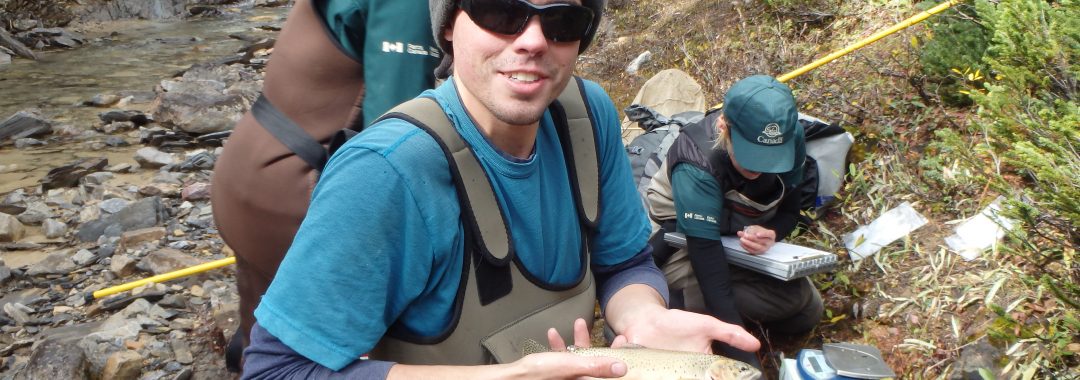The Alberta Conservation Association provided a grant to help research the impact of stocking of non-native trout on alpine ecosystems. This project is being led by MSc student Allison Banting with the help of Dr. Mark Taylor and Rolf Vinebrooke. Thanks ACA for your continued support of the PoeschLab.
Category Archives: Restoration and Reclamation
Once species or their habitat have declined, restoration and reclamation is needed. One important component of restoration and reclamation is developing habitat offsets. Many countries have adopted habitat offsetting policies (e.g., Canada, United States, Europe, Australia, New Zealand, and United Kingdom), where the ideal goal is ecological equivalency, such that offsets are done in a manner which replaces habitats “like-for-like” in areas in close proximity to where those habitats were displaced. When ecological equivalency cannot be achieved with habitat offsets, such as when the extent, duration and intensity of the impacts are sufficiently broad in spatio-temporal scale (e.g. surface mining, Sun et al. 2017), offsetting currencies and flexibility may be needed. Research topics, includes: assessing the efficacy of fish stocking for restoration, developing methods to for offsetting fisheries productivity, advancing expertise and methodologies in hydroacoustics.
Maitland, B. (2015) Stream Crossings in the Western Boreal Forest: Assessing Impacts and Prioritizing Restoration for Native Freshwater Fishes
Thesis Title: Stream Crossings in the Western Boreal Forest: Assessing Impacts and Prioritizing Restoration for Native Freshwater Fishes
Author: Bryan M. Maitland
Abstract
Growing anthropogenic development in response to rising demands for natural resources is a major concern for freshwater fish, particularly in resource rich regions such as Canada’s boreal forest. Expanding networks of industrial resource roads has led to the installation of hundreds of thousands of stream-crossing structures that are becoming increasingly common anthropogenic features on North American riverscapes. These structures can reduce available fish habitat, deteriorate instream habitat, and disrupt ecological connectivity by acting as barriers to fish and aquatic organism movement. My objectives were (i) to determine the extent to which commonly installed stream crossings affect stream fish communities in a boreal forest watershed, and (ii) to assess the application of operational research tools that utilize an optimization framework for mitigating the effects of fragmentation on native freshwater fish and informing restoration planning in the boreal forest. I used mixed-effects modeling and multivariate analyses to determine the effects of stream crossings from 33 culverted, bridged, and reference streams in an industrializing region of the boreal forest in west-central Alberta. Instream habitat characteristics such as mean depth, percent fines, and turbidity showed significant between- as well as within-stream differences among stream crossings. I found that the majority of fish species exhibited significantly lower densities (n·m -2) in upstream habitats as compared to downstream habitats, including a significant reduction in Slimy Sculpin densities in streams with culverts compared to reference streams. Multivariate tests showed that fish assemblages differ as a function of stream type and location. The prioritization method utilized in this study suggests that large gains in potential connectivity could be realized with a moderate investment (~$200K to $500K). I found that the operational research tool can be used to develop cost-benefit curves from the study watersheds, which can be used to minimize overall restoration costs to achieve particular management objectives in watersheds of interest, as well as provide defendable evidence for budget planning to regulators and decision-makers. Additionally, varying model parameters that account for species-specific differences in habitat use (e.g. dispersal distance) affected prioritization solutions, and should be considered in future prioritization analyses. In addition to effecting fish passage and stream connectivity, my results suggest that culverts may also be altering fish habitat, further contributing to large-scale changes in stream fish communities in the boreal forest. Further, my research highlights the efficacy of a novel, easy to use optimization-based barrier prioritization toolset that has minimal data requirements, is applicable to both stream-resident and long-range migratory species, and significantly reduces the mathematical and technical expertise needed to perform relatively complex optimization analyses.
Poesch, M.S., Walker, S.C., and D.A. Jackson (2009) Functional diversity indices can be driven by methodological choices and species richness. Ecology 90(2): 341-346.
Abstract:
Functional diversity is an important concept in community ecology because it captures information on functional traits absent in measures of species diversity. One popular method of measuring functional diversity is the dendrogram-based method, FD. To calculate FD, a variety of methodological choices are required, and it has been debated about whether biological conclusions are sensitive to such choices. We studied the probability that conclusions regarding FD were sensitive, and that patterns in sensitivity were related to alpha and beta components of species richness. We developed a randomization procedure that iteratively calculated FD by assigning species into two assemblages and calculating the probability that the community with higher FD varied across methods. We found evidence of sensitivity in all five communities we examined, ranging from a probability of sensitivity of 0 (no sensitivity) to 0.976 (almost completely sensitive). Variations in these probabilities were driven by differences in alpha diversity between assemblages and not by beta diversity. Importantly, FD was most sensitive when it was most useful (i.e., when differences in alpha diversity were low). We demonstrate that trends in functional-diversity analyses can be largely driven by methodological choices or species richness, rather than functional trait information alone.
Citation: Poesch, M.S., Walker, S.C., and Jackson, D.A. 2009. Functional diversity indices can be driven by methodological choices and species richness. Ecology 90(2): 341-346.
Also Read:
Poesch, M.S., Mandrak, N.E., and R. L. McLaughlin (2008) A practical framework for selecting among single species, multi-species and ecosystem-based recovery plans. Canadian Journal for Fisheries & Aquatic Science 65: 2656-2666.
Abstract:
Science-based approaches for selecting among single-species, community-, and ecosystem-based recovery plans are needed to conserve imperilled species. Selection of recovery plans has often been based on past success rates with other taxa and systems or on economic cost, but less on the ecology of the system in question. We developed a framework for selecting a recovery plan based on the distributions and ecology of imperilled and nonimperilled species across available habitat types and applied it to fishes in the Sydenham River, Ontario, Canada. We first tested whether distributions of fishes were adequately predicted by habitat features hypothesized to limit the distributions of imperilled fishes versus a broader set of habitat features known to predict fish distributions. We then tested whether imperilled species occurred in similar or disparate habitat types. For the Sydenham River, an ecosystem-based recovery plan was deemed most appropriate because imperilled species occur in disparate habitat types. We lastly provide decision criteria to facilitate applications of our framework to the selection of recovery plans for other species and systems.
Citation: Poesch, M.S., Mandrak, N.E., and McLaughlin, R.L. 2008. A practical framework for selecting among single species, multi-species and ecosystem-based recovery plans. Canadian Journal for Fisheries & Aquatic Science 65: 2656-2666.
Also Read:



